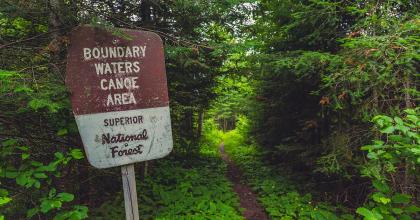The Northern Institute of Applied Climate Science, the Society of Outdoor Recreation Professionals, the US Forest Service Western Wildland Environmental Threat Assessment Center, and the USDA Climate Hubs are offering a recreation-focused Adaptation Planning and Practices training in a series of seven virtual 1-hour sessions.
This unique opportunity provides hands-on training in considering climate change information and identifying adaptation actions for outdoor recreation management. Participants will receive coaching and feedback on their own real-world climate adaptation project throughout the course.
Through this course, participants will be able to:
- Identify locally-important climate change impacts, challenges, and opportunities
- Develop specific actions to adapt recreation management to changing conditions
- Use the Adaptation Workbook to create their own “climate-informed” projects
- Better communicate with stakeholders about key climate change impacts, challenges, and opportunities
- Access post-training support from NIACS staff during project planning and implementation
Who should participate?
This training is designed for outdoor recreation professionals in the United States with a focus on nature-based recreation. This includes recreation managers on federal, state, county, municipal, and tribal lands. Also welcome are managers of private entities such as camps, resorts, outfitters, and ski hills. Individuals as well as small teams can participate in the course.
Application Process
We ask participants to bring real-world projects of your very own to use as examples as a way to get the most from this course. Ideally, this is a relevant project from your work, such as a management plan or another effort that you're currently working on. During the course, we'll help you consider how climate change could affect your project area and your management, and what adaptation options you have available. At the end of the course, you’ll have a custom-built adaptation plan that’s ready to implement!
There is no fee thanks to support from the US Forest Service and the USDA Northern Forests Climate Hub.
Applications will be evaluated to ensure that participants have a project appropriate for the course. To apply, fill out the application below and upload a completed Step 1 worksheet from the file below to this folder. Questions can be directed to Leslie Brandt (leslie.brandt@usda.gov)
The application period is now closed. If you wish to be informed of future opportunities, please contact us.
Course Agenda
We will record a weekly lecture Mondays at 2-3pm ET (optional live attendance). We will also host periodic required live discussion sessions (1-1.25hr). Participants will be able to choose from 4 potential times for discussion sessions (Tuesday or Wednesday morning or afternoon).
Session 1 (week of April 5) — Course Introduction; Defining Project Goals and Objectives. Required discussion session: Introduce projects and participants in small groups
Session 2 (week of April 12) — Understanding and Evaluating Climate Change Vulnerabilities. Optional discussion session: Climate resources and tools
Session 3 (week of April 19) — Evaluating Management Challenges and Opportunities. Required discussion session: Recap steps 2 and 3
Session 4 (week of April 26) — Identifying Adaptation Strategies, Approaches, and Tactics. Optional discussion session: In-depth on the Recreation Adaptation Menu
BREAK No session (week of May 3) Catch up on work.
Session 5 (week of May 10) — Monitoring and Evaluating Effectiveness. Check-in with instructors
Session 6 (week of May 17) — Climate Change Communication. Required discussion session: Recap steps 4 and 5
Session 7 (week of May 24) — Sharing Adaptation Projects. Required discussion session: Project presentations
This training is co-hosted by the USDA Climate Hubs, the Society of Outdoor Recreation Professionals, the US Forest Service Western Wildland Environmental Threat Assessment Center, and the Northern Institute of Applied Climate Science.

